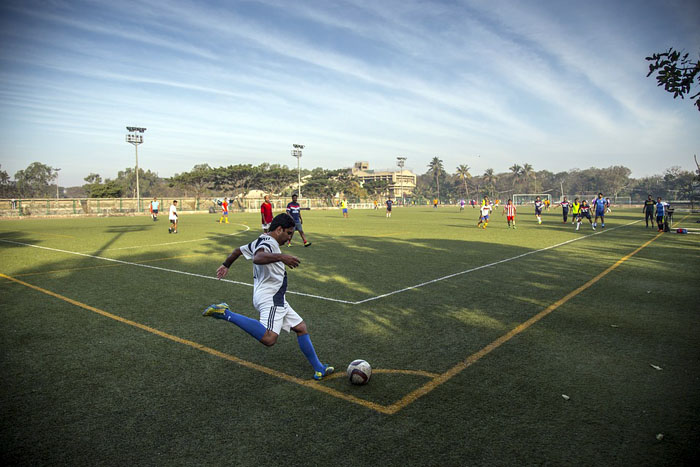Soccer is perhaps the world's favorite spectator sport, popularly known as "Football" in Britain and other European countries. This game can be as frustrating as golf, as physical as football and hockey, as erratic as baseball, and as exciting as basketball. No simple word can describe the popularity of the game, with a global television audience of 49 billion people for the 2002 World Cup alone (I know that's more than the world's population, this figure is an 'accumulated' audience, meaning if people watched more than one game, which most people did, they were counted each time).. The game is exciting and highly addictive to watch and play.
Professional game rules require 11 players per team, 10 playing the field and one goalkeeper. With the use of a round ball, the match is played with the two teams wearing shirts of different colors with distinctive soccer patches. The game is divided into two sets, each for 45 minutes long with the referee adding "extra time" based on time being wasted or play being stopped during the original 45 minutes. Usually, the extra time will be about one-to-three minutes.
A maximum of three substitutes may be used in any match played in an official competition organized under the auspices of the World Governing body Federation International Football Association (FIFA), the confederations or the national associations. However, in other competitions the rules must state how many substitutes may be nominated, from three up to a maximum of seven.
 taking a corner
taking a cornerThe decision regarding a match ending with a tie score usually depends on the actual type of game being player. There are times when the just simply ends in a tie score after the regular 90 minutes game plus any added time. On the other hand, a game ending with a tie score may lead into an overtime with an allotted time of extra play leading to penalty kicks, this usually occurs during a deciding game of a tournament. Each team is given five attempts to score on the opposing goalkeeper, the team with the highest score wins the game.
During a game, players are only allowed to wear soccer equipment and are prohibited to wear anything that may harm him as well as the other. This includes any kind of jewelry and other accessories. The basic soccer equipment of a player include a jersey or shirt with their distinctive soccer patches; shorts, if thermal under shorts are worn, it has to be the same main color as the shorts; stockings; and footwear, soccer shoes, boots, cleats.
There are instances that players may use extra equipments such as shin guards and headgears. The shin guards protect the leg below the knee and are completely covered by the stockings. These are either made of rubber, plastic, or similar substances. While the head gear are available to protect younger players when heading the ball. For goalkeepers, they must wear a color that separates him from the other goalkeeper, players, the referee and the assistant referees.
There are four important details that one should know about the game before he is ready to play soccer. The first is that only the goalkeeper is allowed to use his hands, and this is only within the confines of the marked-off area surrounding the goal. When a player uses their hands on a ball, the opposing team gets a free kick from the spot of the violation.
The second vital information that you should remember about the game is that players are generally penalized for rough or unfair play with the use of cards. A yellow card is considered a stern warning, while a red card signifies a serious violation. Once a player receives a red card it means that he had been ejected from the game and cannot be replaced and that leaves the player's team with fewer players. Meanwhile receiving two yellow cards will equal to a red card, meaning the player will receive the same penalty.
Related Pages
- Basic Rules of Football
- A Ball, Some Friends, and a Soccer Goal — an article about all you need for a game.
- Coaching Soccer
- What is Futsal? a variation of soccer
- Football Field Dimensions
- See also soccer terms


 Current Events
Current Events